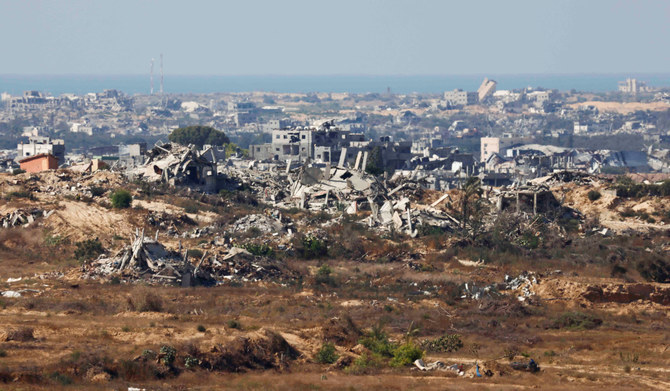GENEVA: Nearly two-thirds of the buildings in the Gaza Strip have been damaged or destroyed since the Gaza war began in October, the UN said Friday.
“UNOSAT’s latest damage building assessment, based on satellite imagery ... reveals that 151,265 structures have been affected in the Gaza Strip,” the UN Satellite Center said.
“Of these, 30 percent were destroyed, 12 percent severely damaged, 36 percent moderately damaged, and 20 percent possibly damaged, representing approximately 63 percent of the total structures in the region.”
The assessment compared imagery from May 2023 onward with images from July 6 this year.
“The impact on civilian infrastructure is evident, with thousands of homes and essential facilities being damaged,” the agency said.
UNOSAT said the total debris in the Gaza Strip generated by the conflict amounts to approximately 41.95 million metric tonnes. The figure is up 83 percent from the nearly 23 million tonnes estimated on Jan. 7.
The conflict has resulted in 14 times more debris than the combined total from all previous conflicts in the Palestinian territory since 2008, UNOSAT said.
The agency estimated that 114 kg of debris was generated for each square meter in the Gaza Strip.
Geneva-based UNOSAT says its satellite imagery-based analysis helps the humanitarian community assess the extent of conflict-related damage and helps shape emergency relief efforts.
Nearly two-thirds of Gaza buildings damaged in war — UN
https://arab.news/94fpd
Nearly two-thirds of Gaza buildings damaged in war — UN

- The assessment compared imagery from May 2023 onward with images from July 6 this year
- The latest war has resulted in 14 times more debris than combined total of previous ones
Arab Coalition announces ‘limited’ airstrike targeting two ships that smuggled weapons to Yemen

- Coalition urges evacuation of the Port of Mukalla, signaling that a major military operation to force an STC withdrawal could be imminent
- Spokesman says the two ships transported weapons from the UAE port of Fujairah to Mukalla without getting permission from Coalition command
RIYADH: The Coalition to Support Legitimacy in Yemen on Tuesday said it conducted a “limited” airstrike targeting two ships that smuggled weapons and other military hardware into Mukalla in southern Yemen.
In a statement carried by the Saudi Press Agency (SPA), the Coalition Forces spokesman, Major General Turki Al-Maliki, said that two ships coming from the port of Fujairah in the United Arab Emirates entered the Port of Mukalla in Hadramaut without obtaining official permits from the Joint Forces Command of the Coalition.
“The crews of the two ships disabled the tracking systems of the two ships and unloaded a large quantity of weapons and combat vehicles to support the Southern Transitional Council forces in the eastern governorates of Yemen (Hadramawt, Al-Mahra) with the aim of fueling the conflict. This is a clear violation of imposing a truce and reaching a peaceful solution, as well as a violation of UN Security Council Resolution No. (2216) of 2015 AD,” said the spokesman.
The coalition urged civilians and fishermen to evacuate the Port of Mukalla, signaling that a major military operation to force an STC withdrawal could be imminent.

Al-Maliki said the Coalition Forces acted on a request by Rashad Al-Alimi, the president of the Yemeni Presidential Leadership Council, “to take all necessary military measures to protect civilians in the governorates of Hadramawt and Al-Mahra.”
Al-Alimi, the president of the Yemeni Presidential Leadership Council, warned last week that unilateral actions by the STC were pushing the country toward a dangerous tipping point.
“Given the danger and escalation posed by these weapons, which threaten security and stability, the Coalition Air Forces conducted a limited military operation this morning targeting weapons and combat vehicles unloaded from the two ships at the port of Al-Mukalla. This was done after documenting the unloading, and the military operation was carried out in accordance with international humanitarian law and its customary rules, ensuring no collateral damage occurred,” spokesman Al-Maliki said on Tuesday.
READ MORE: Analysis: The risks of carving up Yemen
He affirmed the Coalition’s "continued commitment to de-escalation and enforcing calm in the governorates of Hadramawt and Al-Mahra, and to prevent any military support from any country to any Yemeni faction without coordination with the legitimate Yemeni government and the Coalition. This is aimed at ensuring the success of the Kingdom and the Coalition’s efforts to achieve security and stability and prevent the conflict from spreading.”
Disregarding previous agreements with the Coalition, the group calling itself Southern Transitional Council, or STC, launched a sweeping military campaign early in December, seizing the governorates of Hadramaut along the Saudi border and the eastern governorate of Al-Mahra in Yemen’s border with Oman.
The UAE-backed STC forces captured the city of Seiyun, including its international airport and the presidential palace. They also took control of the strategic PetroMasila oilfields, which account for a massive portion of Yemen’s remaining oil wealth.

This prompted Saudi Arabia to issue a firm demand for the STC to withdraw and hand over the seized areas to the National Shield Forces, a Saudi-backed unit.
The coalition warned that any military movements undermining de-escalation efforts would be dealt with immediately to protect civilians, according to the Saudi Press Agency.
On Dec. 26, the UAE issued a statement welcoming Saudi Arabia’s efforts to support security and stability in Yemen.
The statement carried by state news agency WAM praised Saudi Arabia’s constructive role in advancing the interests of the Yemeni people and supporting their legitimate aspirations for stability and prosperity.












